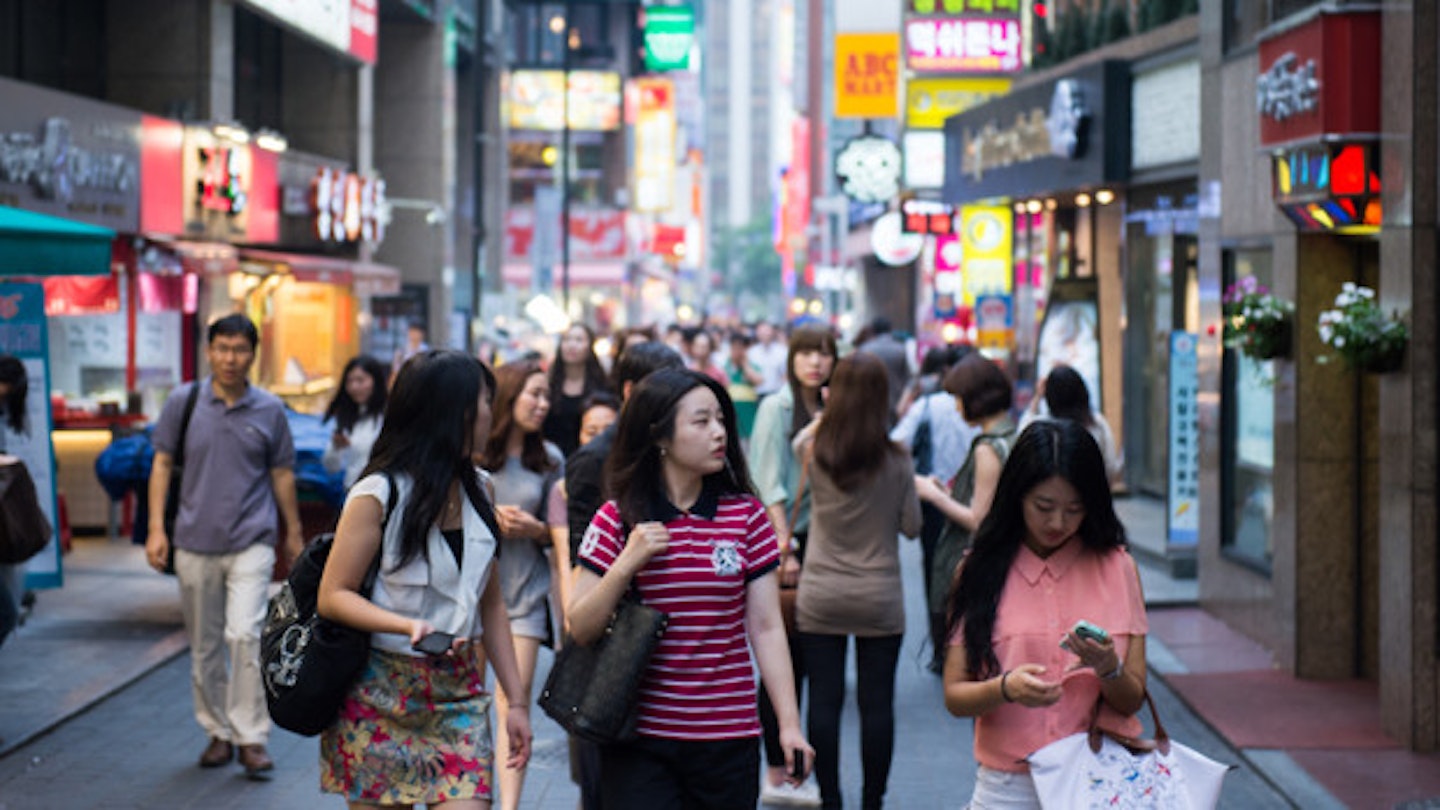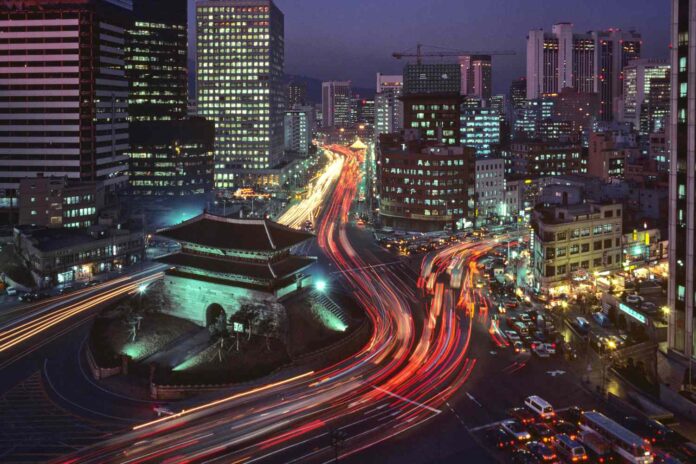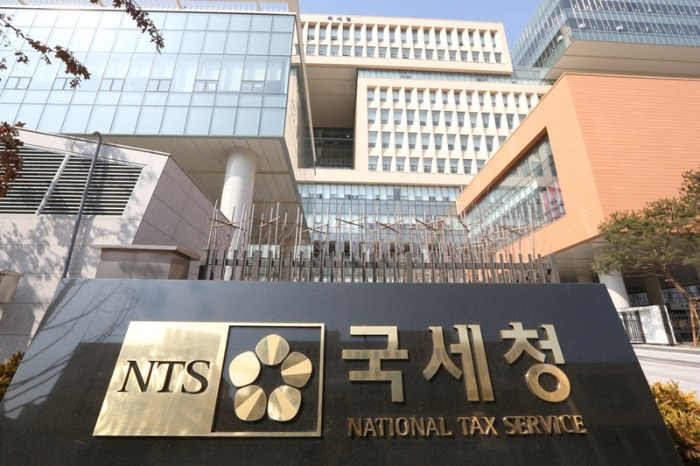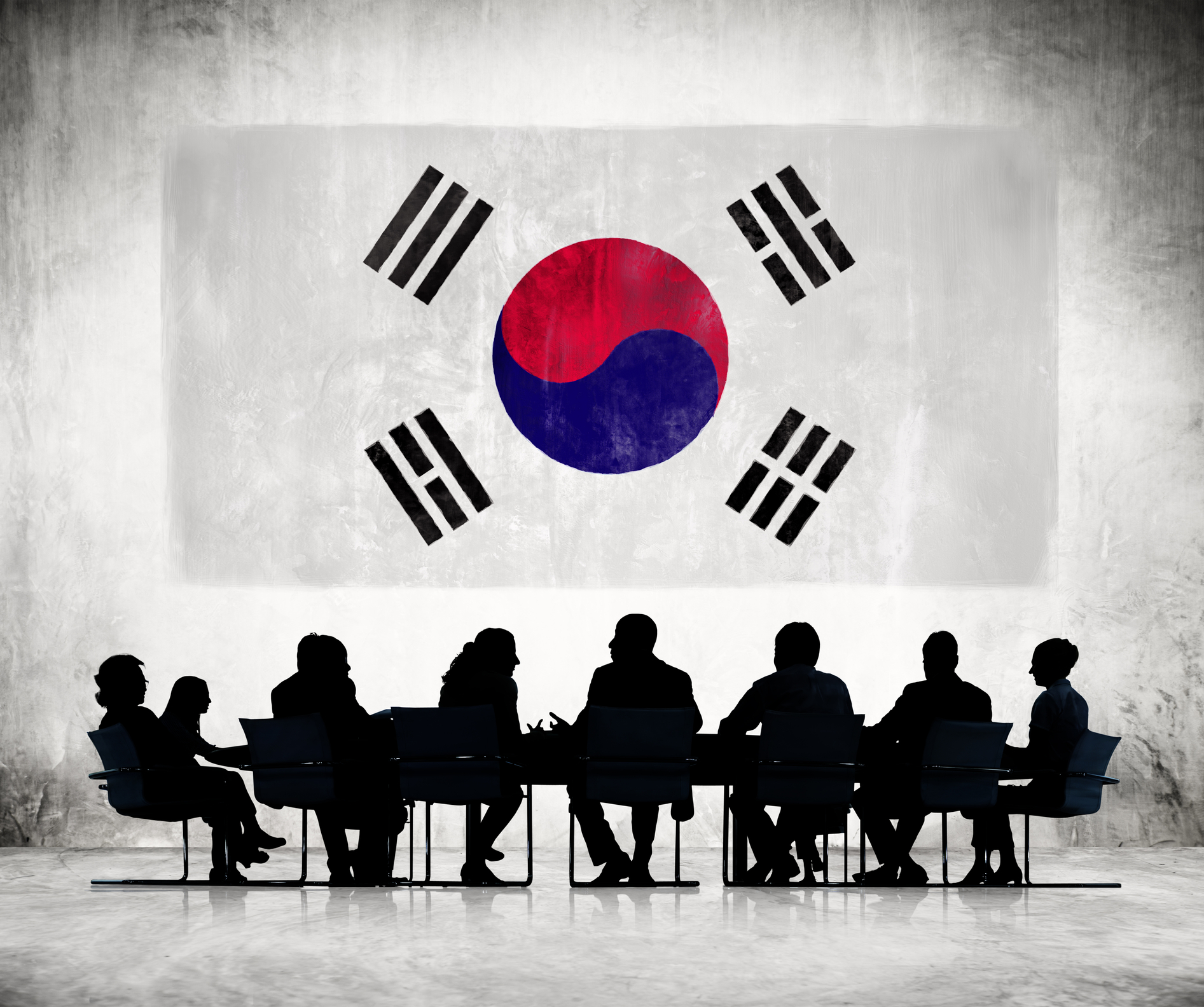An Overview of South Korea: A Technological and Cultural Beacon
South Korea a suitable location for businesses, officially the Republic of Korea, is a dynamic and technologically sophisticated nation in East Asia. Flanked by North Korea to the north, the East Sea to the east, and the Yellow Sea to the west, South Korea thrives as a hub of innovation and tradition. Its capital, Seoul, is a global metropolis renowned for its seamless fusion of modern technology and historic landmarks. As a leader in sectors like technology, entertainment, and automotive manufacturing, South Korea is also celebrated for its “Korean Wave” (Hallyu), which has elevated K-pop, K-dramas, and cinema to worldwide fame.
Living Standards in South Korea: A Modern Urban Lifestyle
South Korea provides a high standard of living supported by rapid economic growth, cutting-edge infrastructure, and accessible healthcare.
- Economic Stability
As the 10th largest economy globally, South Korea is home to major corporations like Samsung, LG, and Hyundai. Its economic prosperity offers residents access to lucrative careers and financial security. - Healthcare and Education
The National Health Insurance System ensures affordable and efficient healthcare for all residents. Additionally, South Korea’s rigorous education system produces a highly skilled workforce, contributing to the nation’s global competitiveness. - Urban Amenities
Urban centers like Seoul and Busan boast world-class public transportation, vibrant cultural activities, and modern amenities. However, high housing costs in these cities remain a common concern. - Balancing Work and Life
While South Korea is known for its industrious culture, recent efforts to reduce working hours and improve labor laws are reshaping the work-life balance for its citizens.
Personal Taxation: A Progressive Framework
South Korea’s tax system is progressive, ensuring contributions align with income levels.
- Income Tax
- Tax rates range from 6% for annual incomes up to KRW 12 million to 45% for earnings exceeding KRW 1 billion.
- An additional regional income tax, typically 10% of the national tax, is also levied.
- Social Security Contributions
Employers and employees contribute to programs covering pensions, health insurance, unemployment benefits, and workers’ compensation. - Tax Relief and Deductions
Residents benefit from deductions for expenses like housing loans, education, and charitable donations, reducing their overall tax burden.
Despite higher tax rates, the system funds robust public services, ensuring significant returns for residents.
Corporate Taxation in South Korea
South Korea’s corporate tax system encourages economic growth while maintaining fairness.
- Corporate Tax Rates
- Small businesses with taxable income up to KRW 200 million pay 10%.
- Mid-sized companies pay 20% on income between KRW 200 million and KRW 20 billion.
- Large corporations with income exceeding KRW 20 billion are taxed at 25%.
- Value-Added Tax (VAT)
A standard VAT rate of 10% applies to most goods and services. - Business Incentives
Tax incentives reward companies investing in research and development, green technologies, and emerging industries, supporting innovation and growth.
Key Economic Sectors Driving South Korea
South Korea’s economy is anchored in a diverse range of industries, blending tradition with innovation.
- Technology and Electronics
As the birthplace of global leaders like Samsung and LG, South Korea dominates the production of semiconductors, smartphones, and electronics, significantly boosting exports and GDP. - Automotive Excellence
Hyundai and Kia spearhead South Korea’s automotive industry, which is expanding into electric and autonomous vehicles to remain globally competitive. - Shipbuilding
Renowned for manufacturing large tankers and LNG carriers, South Korea’s shipbuilding sector is driven by firms like Hyundai Heavy Industries and Samsung Heavy Industries. - Entertainment and Culture
The “Korean Wave” (Hallyu) has made South Korea a cultural epicenter, with K-pop, films, and dramas gaining immense global appeal and bolstering the economy. - Pharmaceuticals and Biotechnology
Investments in medical research and vaccine development are transforming South Korea into a leader in life sciences. - Tourism
Iconic destinations like Jeju Island, Seoul, and Busan attract millions of international visitors, cementing South Korea’s place as a premier tourist destination.

Inflation and Cost of Living
While South Korea’s living costs are high, its quality of life justifies the expense.
- Inflation Rates
Generally low, inflation fluctuates between 1% and 3%, though global trends occasionally affect energy and import prices. - Cost of Living
- Housing: Urban housing, particularly in Seoul, is expensive, with rents often consuming a substantial share of income.
- Food and Groceries: Imported goods and dining out can be costly, but traditional markets offer affordable options.
- Transportation: Efficient public transportation systems ensure affordable and convenient travel.
- Healthcare: High-quality healthcare is accessible and affordable due to the national health insurance system.
Despite high costs, competitive wages and advanced infrastructure contribute to a fulfilling lifestyle.
Taxes on Property, Services, and Sales
South Korea’s taxation system is transparent and straightforward, ensuring compliance is manageable.
- Property Tax
Property owners pay annual taxes ranging from 0.1% to 4% based on the property’s assessed value. - Services Tax
Service industries are subject to VAT at 10%, though education and healthcare services are typically exempt. - Sales Tax (VAT)
A 10% VAT is levied on most goods and services, including imports, contributing significantly to national revenues.
Exploring Business Entities in South Korea
Entrepreneurs in South Korea can select from various business structures to match their operational goals and legal requirements:
- Sole Proprietorship
Ideal for small enterprises, a sole proprietorship is easy to establish and manage. However, it comes with unlimited personal liability, making the owner fully responsible for debts. - Limited Liability Company (LLC)
This structure is suited for medium-sized businesses, offering limited liability protection to owners. Their financial risk is capped at their initial investment. - Corporation (Chusik Hoesa)
A favored choice for larger companies, corporations allow the issuance of shares to attract investors. They are subject to stringent regulations but provide significant growth potential. - Branch Office
Foreign companies can set up branch offices in South Korea, enabling them to operate under the umbrella of their parent organizations while accessing local markets. - Partnerships
General and limited partnerships offer flexibility and shared ownership. Liability and operational roles differ based on the type of partnership chosen.
Selecting the right entity is critical for compliance, operational efficiency, and long-term success.
Licenses and Permits for Starting a Business in South Korea
Setting up a business in South Korea requires certain licenses and registrations to comply with legal and industry standards:
- Business Registration
All companies must register with the National Tax Service (NTS) to obtain a business registration certificate. - Industry-Specific Permits
- Food businesses must secure health permits from local authorities.
- Construction firms need approval from the Ministry of Land, Infrastructure, and Transport.
- Foreign Investment Certification
Entrepreneurs from abroad must register their investments with the Korea Trade-Investment Promotion Agency (KOTRA). - Employment Compliance
Businesses planning to hire foreign workers must adhere to labor laws and secure the required permits.
South Korea’s efficient governmental processes ensure a smooth registration experience for businesses.
Opportunities for Expats in South Korea’s Business Landscape
South Korea provides a fertile ground for ex-pats aiming to establish or expand businesses:
- High-Growth Sectors
Expats can thrive in industries such as technology, tourism, education, and food services, where demand is consistently rising. - Government Incentives
Programs like the Startup Visa and grants for foreign entrepreneurs offer financial support and operational guidance. - Collaborative Ecosystem
A strong emphasis on innovation and networking allows expats to build connections with local businesses and institutions. - Cultural Advantage
Products and services reflecting unique cultural backgrounds often find a receptive audience, particularly in diverse urban centers like Seoul.
The supportive entrepreneurial ecosystem makes South Korea an attractive destination for expat-led ventures.
Pathways to South Korean Citizenship for Expats
Expats seeking to establish permanent roots in South Korea can explore the following options:
- Permanent Residency (F-5 Visa)
Achievable after five years of continuous residence or just two years for high-income earners and significant investors. - Naturalization
Applicants must meet criteria such as:- A minimum of five years of continuous residency.
- Proficiency in the Korean language.
- Familiarity with Korean culture and laws.
- Special Naturalization
Expedited citizenship may be available to those married to South Korean citizens or contributing significantly to the economy or cultural sectors. - Dual Citizenship
While traditionally restricted, recent policy changes allow dual nationality for skilled professionals and significant investors.
Citizenship provides full rights, including voting and access to public office.
Advantages of Registering a Business in South Korea
South Korea’s vibrant economy and supportive policies make it an ideal business destination. Key benefits include:
- Economic Dynamism
As the world’s 10th largest economy, South Korea offers robust opportunities in sectors like technology, automotive, and entertainment. - Strategic Location
Situated in East Asia, South Korea provides businesses with access to key markets in China, Japan, and Southeast Asia, bolstered by excellent trade infrastructure. - Innovation Hub
Renowned for its advancements in R&D, South Korea is a leader in IT, electronics, and biotechnology, fostering an environment of growth and innovation. - Entrepreneurial Support
Government programs, such as the D-8 Startup Visa and various grants, simplify the process for new businesses, particularly those led by foreign investors. - Stable Business Climate
With transparent regulations, low corruption, and a strong legal framework, South Korea ensures a secure environment for businesses.
Steps to Register a Company in South Korea
The company registration process in South Korea is well-organized and accessible:
- Select a Business Structure
Decide on a structure that suits your needs, such as a sole proprietorship, LLC, or corporation (Chusik Hoesa). - Reserve a Business Name
Check availability through the Korean Intellectual Property Office (KIPO) to ensure the name complies with legal standards. - Business Registration
Submit your application to the District Tax Office to receive a business registration certificate. Foreign investors may require additional approvals from the Ministry of Trade, Industry, and Energy (MOTIE). - Open a Bank Account
Deposit the required share capital into a local bank account and obtain a certificate of deposit. - Tax and Social Security Registration
Register for corporate tax, VAT, and employee contributions through the National Tax Service (NTS). - Secure Licenses and Permits
Industry-specific permits, such as health certifications for food businesses, must be acquired from relevant authorities.
The process typically takes 2–4 weeks, depending on the complexity of the business.
Costs Involved in Business Registration in South Korea
The expenses for registering a company in South Korea vary based on the type of entity:
- Registration Fees
- Basic costs range from KRW 10,000–50,000.
- Additional fees may apply for notarization and legal documentation.
- Minimum Capital Requirements
- Most businesses have no statutory minimum, but corporations usually require at least KRW 10 million.
- Professional Assistance
Engaging consultants or legal firms may cost between KRW 1–3 million. - Licenses and Permits
Industry-specific permits range from KRW 50,000 to several million, depending on the business nature.
South Korea’s reasonable costs and supportive environment make it attractive for startups and established companies alike.
South Korea’s Global Relations and Trade Networks
South Korea’s diplomatic and trade ties position it as a key player in global markets:
- Free Trade Agreements (FTAs)
Agreements with the U.S., EU, China, and ASEAN reduce tariffs and enhance trade opportunities. - Global Economic Participation
Membership in the WTO, OECD, and APEC fosters collaboration and innovation. - Cultural Diplomacy
The Korean Wave (Hallyu) enhances South Korea’s soft power, strengthening its cultural and economic influence worldwide. - Regional Collaboration
Strong ties with Japan and China promote economic integration and address shared challenges.
These global connections make South Korea a strategic base for businesses targeting international markets.
Comprehensive Social Security in South Korea
South Korea’s social security system is one of the most comprehensive globally, designed to safeguard the well-being of its citizens and residents. Covering essential services, the system ensures financial stability and access to critical resources:
- Healthcare for All
The National Health Insurance Service (NHIS) provides universal healthcare coverage, guaranteeing affordable and high-quality medical services for all residents. From general check-ups to advanced treatments, the system ensures that everyone has access to timely and effective healthcare facilities. - Pension System
The National Pension Scheme serves as a financial safety net for retirees. Employees and employers contribute throughout the working years, ensuring a steady income after retirement and promoting financial independence in old age. - Unemployment Support
Through the Employment Insurance System, individuals who lose their jobs receive financial assistance. The program also offers retraining initiatives to help workers enhance their skills and re-enter the workforce quickly. - Industrial Accident Compensation
Workers injured at their workplace are protected under industrial accident insurance. This program provides financial support during recovery periods, offering peace of mind for employees and their families.
South Korea’s robust social security framework underscores its commitment to equity and public welfare.
Climate and Safety in South Korea
- Seasonal Weather and Activities
South Korea enjoys a temperate climate with four distinct seasons, each offering unique experiences:
- Spring (March-May): Mild and pleasant, this season is celebrated with blooming cherry blossoms, making it ideal for outdoor adventures and festivals.
- Summer (June-August): Hot and humid weather is interspersed with monsoon rains, providing lush greenery and opportunities for water-related activities.
- Autumn (September-November): The cool weather and vibrant autumn foliage create stunning landscapes, attracting locals and tourists to parks and hiking trails.
- Winter (December-February): Cold temperatures and snowfall in the northern and mountainous regions make it a haven for winter sports enthusiasts.
This diversity in climate ensures that residents and visitors can engage in a variety of recreational activities throughout the year.
- Safety and Security
South Korea is renowned for its low crime rates and emphasis on public safety, making it one of the safest countries globally:
- Effective Policing: The country’s well-trained police force maintains a strong presence in both urban and rural areas, ensuring law and order.
- Disaster Management: South Korea’s preparedness for natural disasters, including typhoons and earthquakes, reflects its commitment to citizen safety.
- Enhanced Community Safety: Initiatives like neighborhood watch programs and widespread CCTV coverage contribute to a secure environment.
These factors create a reassuring atmosphere for residents and tourists alike.
The Global Strength of South Korea’s Passport
The South Korean passport is internationally recognized for its exceptional mobility and prestige.
- Visa-Free Access
Holders of a South Korean passport enjoy visa-free or visa-on-arrival entry to over 190 countries, including major destinations like the United States, European Union member states, and much of Asia. - Global Recognition
The strength of the South Korean passport reflects the nation’s robust diplomatic relations and its respected standing on the global stage.
For citizens and naturalized expatriates, the South Korean passport offers unparalleled travel convenience and opportunities for international business.

Education, Growth, and Lifestyle Opportunities in South Korea
- World-Class Education System
South Korea is celebrated for its outstanding education system, emphasizing academic rigor and innovation:
- Primary and Secondary Education: Public schools are well-funded and deliver high-quality education. Private academies, or hagwons, provide additional learning opportunities tailored to individual needs.
- Higher Education Excellence: Institutions like Seoul National University and KAIST rank among the world’s best, attracting students globally.
- Global Competence: The education system fosters critical thinking, technological proficiency, and multilingual skills, preparing students to thrive in the international job market.
- Economic Opportunities and Job Market
South Korea’s dynamic economy provides abundant opportunities across various sectors:
- High-Growth Industries: Key industries include technology, automotive, entertainment, and finance, offering roles in IT, research, and green energy.
- Startup Ecosystem: Government initiatives support entrepreneurs through grants, incubators, and networking programs.
- R&D Focus: Investments in innovation and technology position South Korea as a leader in futuristic industries.
- Modern Infrastructure and Lifestyle
South Korea offers an unmatched quality of life with its state-of-the-art infrastructure and focus on work-life balance:
- Advanced Urban Development: Cities like Seoul and Busan feature high-speed internet, efficient public transport, and modern amenities.
- Cultural and Recreational Activities: Vibrant cultural festivals, world-class museums, and recreational facilities enhance the living experience.
- Sustainability Initiatives: Green spaces and eco-friendly urban designs reflect the country’s dedication to environmental conservation.
- Cultural Integration for Expats
South Korea warmly welcomes expatriates, particularly in its urban centers where English is widely spoken. Community programs and cultural exchange events help newcomers integrate seamlessly, making them feel at home.
South Korea stands out as a global leader in social equity, safety, education, and economic opportunities. Its commitment to enhancing the quality of life through advanced infrastructure, a robust welfare system, and a thriving cultural landscape makes it a desirable destination for residents and businesses alike. From its vibrant seasons to its world-class education and job opportunities, South Korea offers an environment where innovation, tradition, and growth harmoniously coexist.




